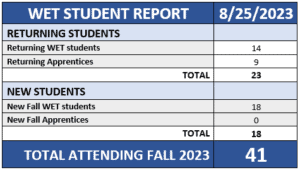My name is Craig Hennager and I have the honor and privilege of serving as the Lead Instructor and Program Chair for the Water Environment Technology (WET) program at Des Moines Area Community College (DMACC). I have been with DMACC for almost 8 years now, initially starting in DMACC Business Resources (DBR). The primary objective of DBR was to support business and industry with specialized training, and my focus there was on municipal and state-related training. I provided continuing education for the municipalities and new hires to the industry. This is how I became acquainted with the WET program.
Prior to joining DMACC, I had worked in water and wastewater and hold a Grade 3 license in wastewater as well as Grade 2 license in both water and distribution. I took several of the DMACC continuing education classes to prepare for my exams while I was working for the City of Ames Water Pollution Control Facilities and The City of Story City Water Department. I firmly believe my own personal experiences with the program and instructors while preparing for my exams played a significant role in assisting our team create this new platform for delivering the WET Program.
The DMACC WET program is a nationally accredited two-year, five semester program. It gives our students the opportunity to earn four Grade 1 credentials, in Wastewater, Collections, Water & Distribution. Additionally, it includes two years of work experience, culminating in a 67-credit degree. The program also offers four, one-year, three semester diplomas in Wastewater/Collections, Water/Distribution, Wastewater/Water, and Collections/Distribution. Finally, the WET program provides four independent, 16 week, certificates offered in Wastewater, Water, Distribution and Collections.
Here are some fast facts about the WET program’s success:

- Ninety percent of the students are in good standing in the program, demonstrating their dedication.
- Five students unfortunately lost their Last Dollar Scholarships this year due to legislative changes, despite filing their FAFSA by the deadline.
- We are proud to have one international student in the program.
- Additionally, three women are part of the program.
- Furthermore, we have six students who have graduated from high school in the past 3 years
What makes our program special, in addition to being one of the only accredited municipal water treatment programs in the nation, is that we are taking full advantage of all the innovative technology available today in collegiate academia. In addition, we offer a flexible program that blends virtual, online, and face-to-face instruction, ensuring broader access to the industry.
We believe that at the heart of our program are the five required internships. Each semester, students work a minimum of 20 hours per week in the industry, though most of our students are working full-time and attending school full-time. They document and share their experience with the instructors, supervisors, and other students in the form of blogs. We like to think we put the “earn” in “learn”! Or is it, “earn while you learn”? It is both! We’ve got you covered.
It is not an easy program, but it moves quickly. Our graduates are learning in real-time alongside established operators in both the workplace and the classroom. Our instructors are required to carry at least a Grade 3 license, with most holding Grade 4 and still actively working in the industry. Their commitment and dedication to the students is on full display by giving back to the industry through being adjunct instructors for the program.
It is truly humbling and inspiring to get to work with amazing students and awesome teachers every day.
To learn more about our program and our federally recognized Department of Labor Water and Wastewater apprenticeships, please explore the links below. Each apprenticeship has its own unique specialized curriculum.
- Water and Wastewater Programs
- About WET Program
- WET Facebook
- WET Job Board
- Success Stories and Testimonials



